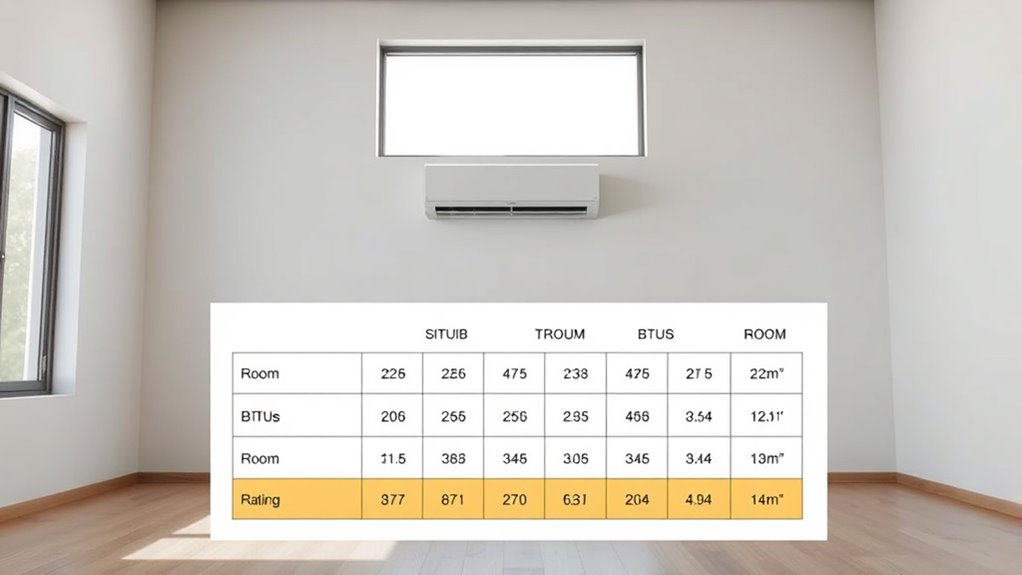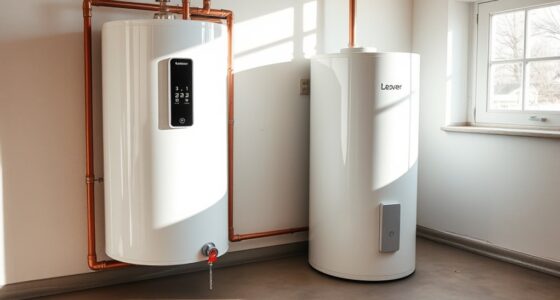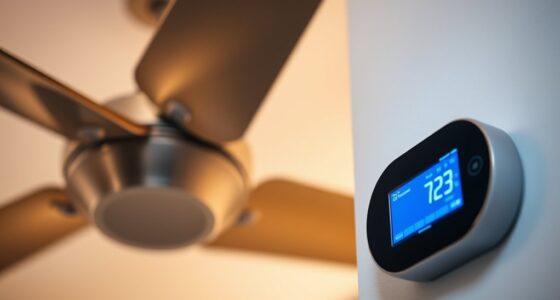To find the right size AC for your room, consider the square footage: up to 150 sq ft, choose 5,000–6,000 BTUs; 250–300 sq ft, go for around 8,000–10,000 BTUs; 350–400 sq ft, about 12,000 BTUs; and over 400 sq ft, select 14,000 BTUs or more. Factors like sunlight, ceiling height, and insulation also matter. Keep reading to see a simple chart that makes this process easier.
Key Takeaways
- Match your room size to the recommended BTU range for effective cooling and energy efficiency.
- Use a simple chart: up to 150 sq ft needs 5,000–6,000 BTUs, while over 400 sq ft requires 14,000 BTUs or more.
- Consider factors like ceiling height, sunlight exposure, and insulation to adjust BTU needs accordingly.
- Properly size your AC to prevent frequent cycling, uneven cooling, and higher energy bills.
- Follow installation and maintenance tips to ensure optimal performance and long-term energy savings.
Determining the Ideal AC Size for Your Room

Choosing the right air conditioner size is crucial to guarantee your space stays comfortable and energy-efficient. If you pick an AC that’s too small, it won’t cool your room effectively, leading to constant running and higher energy bills. Conversely, an oversized unit will cycle on and off too frequently, wasting energy and causing uneven cooling. To avoid these issues, understanding the correct BTU (British Thermal Units) needed for your room size is essential. This ensures your AC operates at peak energy efficiency, saving you money and reducing wear on the system.
When selecting the right size, consider the room’s square footage, as this will determine the BTU capacity required. For small rooms up to 150 square feet, a 5,000 to 6,000 BTU unit typically suffices. For larger spaces, such as 250 to 300 square feet, you’ll need around 8,000 to 10,000 BTUs. As the room size increases, so does the needed cooling capacity—rooms of 350 to 400 square feet generally require about 12,000 BTUs, and spaces over 400 square feet may need 14,000 BTUs or more.
In addition to BTU size, proper installation plays a significant role in maximizing energy efficiency. When installing your AC, follow key installation tips like ensuring the unit is level, sealing any gaps around the window or wall openings, and positioning it in a shaded, well-ventilated area. These steps prevent energy loss and help the system work more efficiently. Also, make sure the air filters are clean and replaced regularly to improve airflow and reduce strain on the unit. Proper insulation in the room can further enhance energy efficiency by preventing cool air from escaping and warm air from entering, reducing the workload on your AC. Moreover, ongoing monitoring of AI security vulnerabilities can help ensure your system remains safe and reliable in the long term.
Understanding the correct BTU for your room size and following proper installation tips ensures your air conditioner operates efficiently. It minimizes energy consumption, extends the lifespan of your unit, and keeps your space comfortably cool without excessive costs. When shopping for an AC, consult simple charts that match room sizes to BTU ratings, and always consider additional factors like ceiling height, sunlight exposure, and insulation. This way, you guarantee your cooling system is perfectly matched to your space, providing ideal comfort and energy savings year-round.
Frequently Asked Questions
How Does Room Insulation Affect AC Size Needs?
Your room insulation quality and window efficiency greatly impact your AC size needs. If your insulation is poor or windows are drafty, your space loses cool air faster, so you’ll need a larger AC unit to compensate. Conversely, well-insulated rooms with energy-efficient windows retain cooled air longer, meaning you can opt for a smaller unit. Improving insulation and window efficiency helps reduce your cooling requirements and energy costs.
Can Multiple Small Units Outperform One Large AC?
Multiple small units can outperform one large AC if you prioritize energy efficiency and flexible cooling. They allow you to target specific areas, reducing waste and lowering energy costs. Plus, installation costs for smaller units are often less complicated and cheaper. However, managing multiple units might be more complex. If you want efficient, customizable cooling, using several smaller units could be your best choice.
What’s the Impact of Ceiling Height on AC Requirements?
If your ceiling soars like a skyscraper, it drastically impacts your AC needs. Higher ceilings mean more space for heat to escape, making airflow distribution harder and requiring a more powerful unit. You’ll need to take into account increased BTU capacity to cool the area effectively. Proper airflow distribution becomes essential to prevent hot spots, ensuring the cool air reaches the higher reaches of your room and keeps it comfortably chilled.
How Do Sunlight Exposure and Shade Influence AC Sizing?
Sunlight impact and shade effects considerably influence your AC size. If your room receives direct sunlight, it absorbs more heat, requiring a higher BTU capacity to stay cool. Conversely, shaded areas stay cooler naturally, so you can opt for a smaller AC unit. Consider window treatments, trees, or awnings to reduce sunlight impact, helping your AC run more efficiently and saving energy. Adjust your unit size accordingly for ideal comfort.
Are There Different Sizing Guidelines for Commercial Spaces?
Yes, commercial HVAC and office cooling often follow different sizing guidelines than residential systems. You need larger capacities to handle higher heat loads, multiple zones, and equipment. You also consider factors like occupancy, equipment heat output, and building design. Proper sizing guarantees efficient operation, comfort, and energy savings. So, when planning your commercial cooling system, consult specialists who understand the specific requirements of commercial spaces.
Conclusion
Now that you know the right BTU for your room, you’re ready to choose the perfect AC. Remember, size matters—smaller rooms need less power, larger spaces demand more. Don’t forget to factor in factors like sunlight and insulation. With this simple sizing strategy, you’ll stay cool comfortably and confidently. So, size up, specify, and stay satisfied with your ideal air conditioner—because the right fit makes all the difference!









